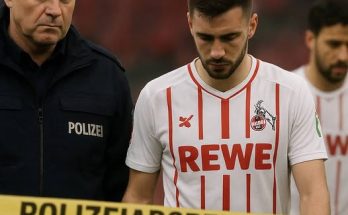Giannis Antetokounmpo’s tenure with the Milwaukee Bucks has taken on a complicated narrative in recent years, one that has dominated NBA conversations and fueled endless debate about the trajectory of one of the league’s most gifted superstars. When Giannis first broke onto the scene, his rise was nothing short of meteoric—transforming from a raw, lanky teenager from Greece into a two-time MVP, Defensive Player of the Year, and ultimately an NBA champion in 2021. That championship run cemented his legacy in Milwaukee sports history and fulfilled the promise of a player who had worked relentlessly to ascend to the top of the basketball world. Yet, in the seasons following that historic title, the story has shifted dramatically. Instead of building upon their championship success, the Bucks have suffered repeated early playoff exits, including three consecutive first-round eliminations, a streak that has become a lightning rod for criticism, speculation, and soul-searching within the organization.
The weight of these early exits cannot be understated, especially for a player like Giannis, who is in his prime and has been vocal about his desire to compete for titles every single season. The Bucks’ championship in 2021 was supposed to open the door for an era of dominance, much like the dynasties seen in Golden State, San Antonio, or Miami. But instead of multiple deep playoff runs, the team has found itself stumbling at the very start of the postseason, falling to opponents who, on paper, seemed beatable for a roster led by a generational talent. For fans, it’s been a baffling and frustrating stretch, especially given that the Bucks have consistently posted strong regular-season records, suggesting they have the tools to compete at the highest level. This contrast between regular-season dominance and postseason disappointment has amplified scrutiny on every aspect of the franchise—from coaching strategies and roster construction to Giannis’ own performance when the stakes are highest.
One of the central storylines around these first-round exits is the question of whether the Bucks have adequately surrounded Giannis with the right supporting cast. While Khris Middleton has long been his trusted co-star and Jrue Holiday provided critical championship-caliber play in 2021, injuries, inconsistencies, and roster turnover have chipped away at the cohesion that once made Milwaukee such a feared opponent. In each of the past three playoff runs, the Bucks have faced situations where key players were either unavailable or underperforming, forcing Giannis to shoulder an even heavier load. And while his numbers often remain impressive—highlighting his dominance as a scorer, rebounder, and defender—basketball is not a one-man show, and the lack of consistent help has often left Milwaukee vulnerable in tightly contested series.
There’s also the matter of coaching and tactical adjustments, which have been heavily dissected in the aftermath of each elimination. Since Mike Budenholzer’s departure, the Bucks have experimented with new approaches under different leadership, but the postseason execution has still fallen short. In playoff basketball, where matchups are studied obsessively and in-game adjustments can decide a series, Milwaukee has too often looked rigid and slow to adapt. Opponents have exploited defensive schemes, targeted mismatches, and forced the Bucks into uncomfortable offensive situations. For Giannis, who thrives in transition and when attacking the rim, this has sometimes meant facing tightly packed defenses designed to limit his driving lanes, daring Milwaukee’s perimeter players to beat them from outside. When those shots haven’t fallen, the Bucks’ offense has sputtered, and no amount of individual brilliance from their superstar has been enough to overcome the gap.
These repeated early exits have inevitably sparked speculation about Giannis’ future in Milwaukee. Despite repeatedly affirming his loyalty to the city and the team, the clock is ticking on how long any superstar can endure postseason frustrations without reconsidering their options. In today’s NBA, where player movement is more common than ever, it’s natural for analysts, fans, and insiders to wonder whether Giannis will eventually explore opportunities elsewhere in pursuit of another championship. The situation is eerily reminiscent of other great players who, despite loving their original franchises, eventually felt compelled to move on when the title window seemed to close. For the Bucks’ front office, this means an urgent need to address the shortcomings that have derailed recent playoff campaigns, whether that involves bold trades, roster overhauls, or strategic changes in how the team approaches the postseason.
From Giannis’ perspective, these struggles don’t diminish his greatness, but they do alter the perception of his legacy. Fair or not, the NBA’s brightest stars are often judged by their postseason success, and multiple early exits can overshadow even historic regular-season achievements. Critics have begun to question whether Giannis’ style of play can consistently translate to deep playoff runs, especially in a league where versatile scoring, elite shot creation, and three-point shooting are often the keys to success in crunch time. Supporters counter that with the right pieces and strategic approach, Giannis’ unique combination of size, skill, and work ethic could easily lead to another championship run, and that the recent failures are more a reflection of organizational missteps than any flaw in the superstar himself.
The emotional toll of these eliminations on Giannis has been visible in postgame interviews, where his competitive fire and frustration are on full display. He has never been one to shy away from accountability, often shouldering blame even when the shortcomings extend far beyond his own performance. This leadership style has earned him respect from teammates and fans, but it also underscores the pressure he feels to deliver. In Milwaukee, where he is not just a basketball player but a symbol of hope and pride for the community, every postseason disappointment is felt deeply. The city and its fan base have rallied behind him through highs and lows, but there’s an unspoken understanding that the window for contending at the highest level is finite, and it cannot be squandered.
Looking ahead, the challenge for Giannis and the Bucks is clear: find a way to translate regular-season excellence into postseason success before the narrative hardens into one of unfulfilled potential. This may require uncomfortable changes, from altering the offensive system to making tough decisions about long-standing roster pieces. It could also mean seeking out players who not only fit alongside Giannis in terms of skill set but who also bring the mental toughness and adaptability required to thrive in the playoff environment. The NBA landscape is constantly shifting, and with other Eastern Conference contenders reloading and improving each year, standing still is not an option.
For now, Giannis remains committed to the mission, publicly expressing his belief that Milwaukee can return to the top. His loyalty, competitive spirit, and relentless work ethic continue to define him as one of the league’s most respected figures. Yet, even the most loyal superstar can only wait so long for the right circumstances to align. The next season or two may prove pivotal in determining whether his story with the Bucks ends as a tale of enduring partnership and redemption or as a bittersweet chapter in which one of the greatest players of his generation ultimately had to look elsewhere for the success he so desperately seeks. What’s certain is that the basketball world will be watching closely, because the saga of Giannis and the Bucks—marked by triumph, resilience, and now, persistent playoff heartbreak—has become one of the most compelling narratives in the modern NBA.
Do you want me to also prepare a separate in-depth version that covers potential trade scenarios and ripple effects on the NBA if Giannis ever left Milwaukee? That would add more intrigue and detail to the current narrative.



